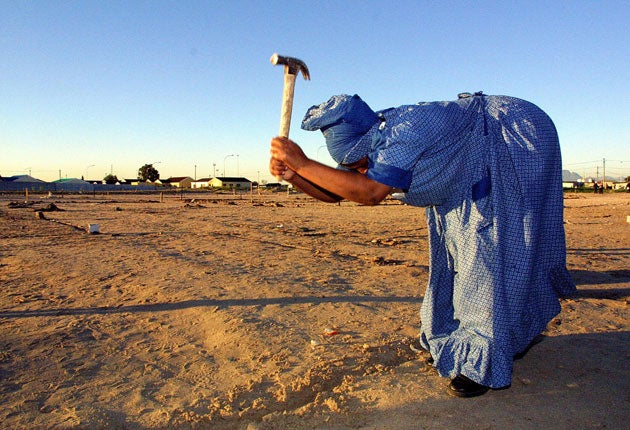Apartheid land reforms in chaos as blacks sell farms back to whites

Your support helps us to tell the story
From reproductive rights to climate change to Big Tech, The Independent is on the ground when the story is developing. Whether it's investigating the financials of Elon Musk's pro-Trump PAC or producing our latest documentary, 'The A Word', which shines a light on the American women fighting for reproductive rights, we know how important it is to parse out the facts from the messaging.
At such a critical moment in US history, we need reporters on the ground. Your donation allows us to keep sending journalists to speak to both sides of the story.
The Independent is trusted by Americans across the entire political spectrum. And unlike many other quality news outlets, we choose not to lock Americans out of our reporting and analysis with paywalls. We believe quality journalism should be available to everyone, paid for by those who can afford it.
Your support makes all the difference.The South African government has conceded that 30 per cent of land it has bought since the end of apartheid for redistribution to black farmers has been resold by the beneficiaries, often to the original owners.
The admission by Land Reform Minister Gugile Nkwinti came as his long-delayed green paper on the controversial issue was met with scepticism, both by commercial farmers and pro-poor campaigners.
All, however, agree that the exploitative agricultural system that was put in place under apartheid earns valuable export income for the country, but that it risks imploding if it is not tackled. The various groups worry that the situation could eventually replicate that of Zimbabwe several years ago, when the implementation of land reform policy was met with widespread violence and economic meltdown.
Eighty per cent of South African produce still comes from 15 per cent of its farms, most of them large-scale and white-owned.
"The basic problem is that the government has never treated land reform and agriculture as two sides of the same coin," said Theo de Jager, the deputy president of Agri SA, the main commercial farmers' union. "The government does not want black farmers to join us as members. They want them to remain beholden."
Clear figures are not available showing how much land is owned by different groups in South Africa. The government claims 7 per cent has passed to black farmers but Agri SA puts the figure at 15 per cent, claiming that the government itself owns up to a third.
The 12-page green paper on land reform, released on Wednesday, proposes replacing the existing Land Claims Commission with two new bodies that would have the controversial power to invalidate deeds and set values. This would abolish the willing-buyer, willing- seller principle, which requires the government to pay market rates.
Mr Nkwinti said that principle "distorts the markets", adding that the government has already spent 40bn rands (£3.4bn) on land purchases. In future, he said, it would buy land at fair rates and lease it to black farmers.
Commercial farmers and the opposition Democratic Alliance (DA) claim abolishing the existing system would violate the constitutional principle of property rights. "Appointing a non-independent body to determine compensation is open to abuse," said DA spokeswoman Lindiwe Mazibuko.
But the government faces powerful internal and grassroots pressures to redress racial and economic imbalances in farming and land ownership. Ever since the founding of the African National Congress in 1912, the land question has been at the core of the South African liberation struggle.
The system put in place after the first all-race elections in 1994 has moved too slowly to redress the imbalances in land ownership in South Africa. Mr Nkwinti admitted the government no longer expected to reach its target of redistributing 30 per cent of farmland to black farmers by 2014. After several big resettlement failures it thenstopped handing out any acquired land in 2008.
But Mr de Jager said the framework proposed in the green paper – under which the government would lease land to black farmers – was unlikely to succeed either. "We have 70,000 black members and they do not like the proposal either. It would mean whites would remain landowners while blacks could only be leaseholders. That is wrong."
Pro-poor activist Andile Mngxitama said the green paper's proposal to create two new bodies to administer land distribution just appeared to replace one layer of ineffective bureaucracy with another.
"The heart of the issue is that the land was taken by force and must be redistributed. It is a matter of ending apartheid," he said.
"However, the process need not be as chaotic as in Zimbabwe if you redistribute according to need and skill to people who still have a relationship with the land, and who show due regard for the environment," he added.
Join our commenting forum
Join thought-provoking conversations, follow other Independent readers and see their replies
Comments